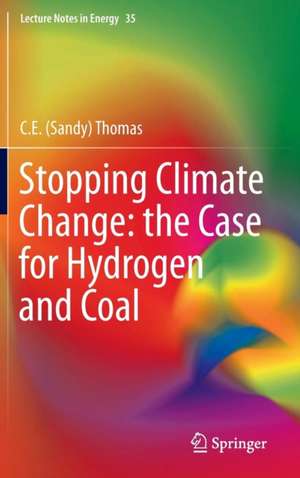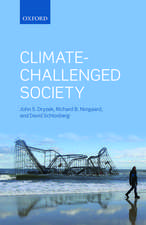Stopping Climate Change: the Case for Hydrogen and Coal: Lecture Notes in Energy, cartea 35
Autor C.E. Sandy Thomasen Limba Engleză Hardback – 5 ian 2017
| Toate formatele și edițiile | Preț | Express |
|---|---|---|
| Paperback (1) | 633.35 lei 6-8 săpt. | |
| Springer International Publishing – 7 iul 2018 | 633.35 lei 6-8 săpt. | |
| Hardback (1) | 639.41 lei 6-8 săpt. | |
| Springer International Publishing – 5 ian 2017 | 639.41 lei 6-8 săpt. |
Din seria Lecture Notes in Energy
-
 Preț: 436.35 lei
Preț: 436.35 lei - 15%
 Preț: 655.60 lei
Preț: 655.60 lei - 18%
 Preț: 952.09 lei
Preț: 952.09 lei - 18%
 Preț: 1012.84 lei
Preț: 1012.84 lei - 15%
 Preț: 635.80 lei
Preț: 635.80 lei - 15%
 Preț: 645.96 lei
Preț: 645.96 lei - 15%
 Preț: 645.47 lei
Preț: 645.47 lei - 15%
 Preț: 640.06 lei
Preț: 640.06 lei - 15%
 Preț: 649.71 lei
Preț: 649.71 lei - 15%
 Preț: 643.84 lei
Preț: 643.84 lei - 18%
 Preț: 954.31 lei
Preț: 954.31 lei - 15%
 Preț: 643.84 lei
Preț: 643.84 lei - 18%
 Preț: 949.73 lei
Preț: 949.73 lei - 18%
 Preț: 1411.69 lei
Preț: 1411.69 lei - 15%
 Preț: 634.18 lei
Preț: 634.18 lei - 15%
 Preț: 649.87 lei
Preț: 649.87 lei - 15%
 Preț: 642.03 lei
Preț: 642.03 lei - 18%
 Preț: 957.62 lei
Preț: 957.62 lei - 15%
 Preț: 652.49 lei
Preț: 652.49 lei - 18%
 Preț: 963.15 lei
Preț: 963.15 lei -
 Preț: 361.03 lei
Preț: 361.03 lei -
 Preț: 391.79 lei
Preț: 391.79 lei - 15%
 Preț: 646.11 lei
Preț: 646.11 lei -
 Preț: 394.29 lei
Preț: 394.29 lei -
 Preț: 391.22 lei
Preț: 391.22 lei - 18%
 Preț: 954.45 lei
Preț: 954.45 lei - 18%
 Preț: 957.62 lei
Preț: 957.62 lei - 15%
 Preț: 647.27 lei
Preț: 647.27 lei - 18%
 Preț: 960.30 lei
Preț: 960.30 lei - 18%
 Preț: 1250.74 lei
Preț: 1250.74 lei - 15%
 Preț: 642.18 lei
Preț: 642.18 lei -
 Preț: 488.71 lei
Preț: 488.71 lei - 18%
 Preț: 1677.21 lei
Preț: 1677.21 lei
Preț: 639.41 lei
Preț vechi: 752.24 lei
-15% Nou
Puncte Express: 959
Preț estimativ în valută:
122.37€ • 126.41$ • 101.84£
122.37€ • 126.41$ • 101.84£
Carte tipărită la comandă
Livrare economică 25 martie-08 aprilie
Preluare comenzi: 021 569.72.76
Specificații
ISBN-13: 9783319316543
ISBN-10: 3319316540
Pagini: 94
Ilustrații: XIV, 137 p. 48 illus., 44 illus. in color.
Dimensiuni: 155 x 235 x 10 mm
Greutate: 0.39 kg
Ediția:1st ed. 2017
Editura: Springer International Publishing
Colecția Springer
Seria Lecture Notes in Energy
Locul publicării:Cham, Switzerland
ISBN-10: 3319316540
Pagini: 94
Ilustrații: XIV, 137 p. 48 illus., 44 illus. in color.
Dimensiuni: 155 x 235 x 10 mm
Greutate: 0.39 kg
Ediția:1st ed. 2017
Editura: Springer International Publishing
Colecția Springer
Seria Lecture Notes in Energy
Locul publicării:Cham, Switzerland
Cuprins
Introduction.- Greenhouse Gases by Sector.- Net Greenhouse gas reduction required by Sector.- Electricity Generator Costs and greenhouse gas emissions.- Petroleum and Coal Proven Reserves: the case for coal and the demise of OPEC.- Greenhouse Gas Reduction Costs compared: electricity vs. fuel cell electric vehicles.- Tri-Generation Stations at Big Box Stores and warehouses.- Economics of Electricity and Hydrogen Co-generation at IGCC plants.- Solar-Hydrogen Generation Systems.- Water Consumption.- Coal mine safety.- Conclusions.
Notă biografică
Dr. C.E (Sandy) Thomas was co-founder and President of H2Gen Innovations, Inc., of Alexandria, Virginia. He was a Vice President at Directed Technologies, Inc., where he led a project with Ford and the U.S. Department of Energy (DOE) to evaluate hydrogen infrastructure options and hydrogen safety. Before DTI, Dr. Thomas was an assistant to Senator Tom Harkin (1987 to 1993) and assisted him in expanding hydrogen and fuel cell research budgets at the DOE. Other research fields included coherent optical data processing, laser fusion and amorphous silicon photovoltaics.
Dr. Thomas earned his degrees in Electrical Engineering from the University of Michigan. He received the 2010 Jules Verne Award from the International Association of Hydrogen Energy; the inscription on the award reads: “For his leadership in systems studies, analyses, and entrepreneurship in development and commercialization of hydrogen technologies.”
Dr. Thomas’ first book, “SustainableTransportation Options for the 21st century and Beyond: a Comprehensive comparison of alternatives to the internal combustion engine,” by Springer (ISBN 978-3-319-16832-6) compares the cost and environmental attributes of various alternative vehicles including batter
Textul de pe ultima copertă
This book documents the advantages and limitations of various electricity generation methods. It illustrates how both electricity and motor fuel can be cost-effectively derived from coal, natural gas or other indigenous fuels, thereby eliminating our dependence on imported oil and the power of OPEC. It favours electricity generation systems powered exclusively by natural gas, coal, nuclear and renewables and motor vehicles powered by hydrogen (electricity from coal gasification with carbon capture and sequestration (CCS) and hydrogen as the fuel powering fuel-cell electric vehicles produced from natural gas or by gasifying coal With CCS.) The book also demonstrates that the US can meet the Climate Change goal of reducing all greenhouse gases by 80% below 1990 levels in both the transportation and electric utility sectors using hydrogen and coal.
Caracteristici
Analyzes the environmental and energy-security impacts of replacing the current mix of electricity generation power plants with cleaner-burning plants Evaluates the cost, greenhouse gas emissions, and water consumption of alternative electricity generators Illustrates how coal and hydrogen can be used to replace society's current dependence on imported oil Includes supplementary material: sn.pub/extras

















